Reviews for March 13th, 2009
Carmen & Geoffrey
Directed by Nick Doob and Linda Atkinson.

This mostly fascinating documentary charts the rise to fame of Carmen de Lavallade and Geoffrey Holder, a husband and wife who met while dancing together on Broadway in Herbert Ross’ “House of Flowers” based on Truman Capote’s book. They instantly had a very strong platonic relationship with one another. De Lavallade had also danced in feature films such as The Odds Against Tomorrow and Carmen Jones as well as dancing as a soloist in the Alvin Ailey Company and as a prima ballerina in the Metropolitan Opera. Between Holder and De Lavallade, Holder manages to resonate the most panache, humor and warmth when he talks to the camera about his many different careers. Besides dancing, he has also worked as a choreographer, singer, actor, painter, and voice-over actor. He even directed and did the costume design for the Broadway production of “The Wiz” back in 1975. A question that comes to mind given his many talents is: what might he be unable to do in the art world? In a candid interview, he humbly admits with his booming voice that his passion for dancing originally came from his desire to dance like his older brother, Boscoe, whom he still looks up to. Where does passion for the other art forms such as painting originate, though? Co-directors Nick Doob and Linda Atkinson include plenty of footage of de Lavallade and Holder dancing separately and together. The history of how they met and flourished in their careers proves to be somewhat fascinating and informative. However, Doob and Atkinson merely skim the surface rather than delving deep into what makes them truly tick and how their past has shapes their lives today. How do they both maintain their youthful joie de vivre? Perhaps interviews with them together while discussing and sharing their thoughts and feelings would have been helpful to add more insight into what they’re like now as a married couple. At a brief running time of 78 minutes, Carmen & Geoffrey manages to be mostly compelling, warm and lively, but ultimately deficient in truly profound revelations or insights. Number of times I checked my watch: 2. Released by First Run Features. Opens at the Quad Cinema.
The Last House on the Left
Directed by Dennis Iliadis.
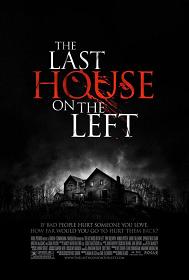
Based on the original film from 1972 by writer/director Wes Craven. Mari (Sara Paxton), a teenager, spends time with her mother, Emma (Monica Potter) and father, John (Tony Goldwyn), at their summer vacation home located in a secluded wooded area near a lake. Her mother initially hesitates to let her go out with her good friend, Paige (Martha MacIsaac), but eventually lets them go and tells her to call home later at night to ensure that she’s safe. At a local convenience store, they meet a seemingly friendly teen named Justin (Spencer Treat Clark) who promises to hook them up weed and lures them to a motel. If you have no clue what’s about to happen next, then you haven’t watched enough horror films. Francis (Aaron Paul), Krug (Garret Dillahunt) and his girlfriend Sadie (Riki Lindhome) along with Justin, Krug’s son, kidnap Mari and Paige together and rape and torture them deep in the woods for no rhyme or reason. Who will be the first one to die? Will one of them be lucky and brave enough to manage to escape or revenge against their brutal kidnappers? None of the surprises will be spoiled here, but, unfortunately, the victims seem too naïve and stupid for you root for them or to care about the answer to any of those questions. Director Dennis Iliadis includes tries to make the scenes feel scary by including some gore and an intense musical score, but the victims’ ordeal often feels dull and meanders while the violence itself becomes less shocking and more tedious, especially in the over-the-top third act. Co-screenwriters Adam Alleca and Carl Ellsworth expect you to suspend too much of your disbelief and to check your brain at the door a lot as the plot progresses into implausibility and inanity. The screenplay pretty much suffers from the same problems of dullness found in the Friday the 13th, another recent horror remake that treads the same waters. Ultimately, The Last House on the Left has plenty of gore and a run-of-the-mill, unimaginative plot that feels tedious, pointless, inane and insipid. Number of times I checked my watch: 6. Released by Rogue Pictures.Opens nationwide.
Severed Ways: The Norse Discovery of America
Directed by Tony Stone.
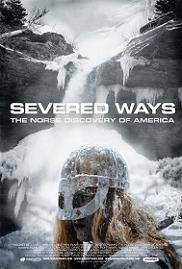
In 1007 AD, two Norsemen, Orn (Tony Stone) and Volnard (Fiore Tedesco), remain the only surviving Vikings when the Skraelings slaughtered the rest of their expedition team on the coast of North America. They both wander through the New World while struggling to stay alive. Watch as they slowly walk around a forest to find trees to chop down with their axes in order to build a humble abode to seek shelter in. Watch as they go searching for food such as fish, eat it and then defecate the next day. Then they wander around some more. For at least the first half of the film, very little actually happens in terms of plot or character development to hold even a patient viewers’ attention. At one point, Orn and Volnard meet two monks, one of whom Orn brutally kills. Orn and Volnard barely speak to one another throughout their journey, though, and, when they do, they don’t really say anything worth listening to. Why should anyone care about what happens to these two Norsemen to begin with? Writer/director Tony Stone, shooting in high definition digital, includes picturesque scenery and cinematography that occasionally looks exquisite, but mostly overuses a shaky camera effect as a means to create intensity. On top of that, there’s plenty of heavy metal music to accompany the scenes, which gives the impression that you’re watching a long music video. Does Tony Stone merely want to test to audience’s patience to see who will be able to fight the urge to walk out and who will just give up and leave? That’s what it seems as though, especially given that the film comes across as tedious and grating for most of its duration. Films with a minimal plot could work if there’s more going on beneath the surface, such as in Silent Light or Hukkle, both of which have lush visuals that hide their innate wealth of emotion and subtle tension, but, in Severed Ways, there’s nothing particularly interesting hidden beneath its surface. At a running time of 107 minutes, Severed Ways manages to be pretentious, tedious, jarring and, ultimately, a grueling test of a viewer’s patience. Number of times I checked my watch: 14. Released by Magnet Releasing. Opens at the Angelika Film Center.
Shuttle
Directed by Edward Anderson.
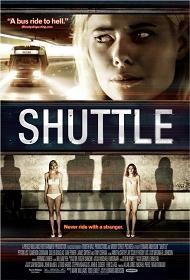
After a vacation in Mexico, Mel (Peyton List) and her best friend, Jules (Cameron Goodman), return to the United States in the middle of the night. They wait inside the airport for their luggage, but it doesn’t arrive. Once they go outside, they can’t find any taxis in the pouring rain and, instead, meet a shuttle bus driver (Tony Curran) who convinces them to get aboard the bus by offering them cheap prices. Three more passengers, Seth (James Snyder), Andy (Cullen Douglas and Matt (Dave Power) join them for a bus ride that they’ll never forget. Little do they know that the bus driver actually has sinister plans in store for them. The screenplay by writer/director Edward Anderson, unfortunately, fails to pack any real punches, though, in the horror/thriller genre and, for the most part, the plot itself could have used a little more imagination and surprises as fuel to keep you riveted until the twisted third act, which won’t be spoiled here. Moreover, none of the victims seem remotely bright or interesting enough to root for or to care about for that matter. It becomes a bit tedious to watch them try to escape from the bus driver over and over again. Where is he driving them to? What might his motive(s) be for holding them hostage and terrorizing them on the shuttle bus? On a positive note, Anderson does add some mystery and suspense to the film by not answering those questions until later on. While it’s a bit clichéd that the film takes place in the middle of the night rather than during the daytime, he makes the most out of the dimly lit settings which nonetheless enhance the somewhat chilly atmosphere. He wisely chooses to minimize the amount of gore shown onscreen and establishes a sense of claustrophobia and intensity as the victims remain helplessly trapped inside the bus. Ultimately, Shuttle feels manages to be a slightly prosaic and tedious, but mostly chilly and intense ride. Number of times I checked my watch: 3. Released by Magnolia Pictures. Opens at Landmark Kendall Square in Boston, MA.
Sunshine Cleaning
Directed by Christine Jeffs.
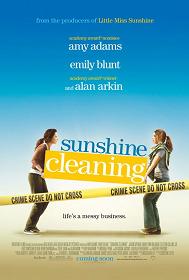
Rose Norkowski (Amy Adams) works as a cleaning woman, raises a seven-year-old son, Oscar (Jason Spevack) by herself and sleeps with her high school sweetheart, Mac (Steve Zahn), a cop who happens to be married. Her sister, Norah (Emily Blunt), lives with her dad, Joe (Alan Arkin), who doesn’t have a real career either unless you count financial scheming as a career. When Rose attends a high school reunion, her old schoolmates compare jobs with one another. Many of them have seemingly found success, at least job-wise, so, because of her own insecurities, she tells them that she’s working in the field of real estate instead of cleaning. Mac informs her of different kind of cleaning job: cleaning up the blood and guts at crime scenes, which would pay more than what she’s making now. Soon enough, Rose teams up with Norah to start a crime scene clean-up company called Sunshine Cleaning and realizes how complex and challenging it can actually be, especially as she tries to juggle it with the more important job of taking care of her own beloved son, Oscar, who has behavior problems such as licking things—including a teacher’s leg. Luckily, Winston (Clifton Collins Jr), a kind employee at a cleaning supply store, lets Rose leave Oscar at the store to take care of him while her dad and sister are too busy. Both Amy Adams and Emily Blunt give impressively raw, emotional performances that invigorate the film with their charisma along with Alan Arkin’s typically zany performance. Screenwriter Megan Holly along with director Christine Jeffs balance dark comedy and drama with mixed results. It’s somewhat moving to observe the dynamic between Rose and Norah as they bond with one another throughout the film. Each character has his or her own flaws or personal conflicts to deal with, which makes them all the more human. While the characters do come-to-life, some of their actions do seem forced and out-of-character rather than organic and believable. A truly great dramedy, though, finds the right balance between feeling like a predictable, entertaining Hollywood film and like a warm, intelligent and refreshingly realistic indie film. The balance here seems to be skewered a little too much toward a Hollywood film with not enough refreshing moments that stand out like in indie films. Admittedly, a predictable plot in itself isn’t necessarily something negative as long as it’s handled with care and sensitivity toward developing its characters believably, which, for the most part, happens here with the exception of a few awkward scenes. At a running time of 102 minutes, Sunshine Cleaning has a lively cast, emotionally raw performances, plenty of charisma and a little quirkiness which just barely compensates for its awkward blend of dark comedy and drama as well as its somewhat contrived plot. Number of times I checked my watch: 3. Released by Overture Films. Opens at AMC Loews Lincoln Square and Landmark Sunshine Cinemas.
Tokyo Sonata
Directed by Kiyoshi Kurosawa.
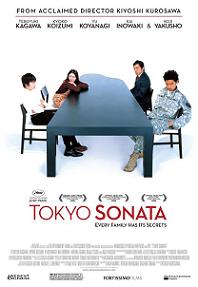
In Japanese with subtitles. When Ryuhei Sasaki (Teruyuki Kagawa) gets fired from his administrative job at a corporation, he feels too ashamed to tell the sad news to his wife, Megumi (Kyoko Koizumi), and two sons, Kenji (Kai Inowaki) and Takashi (Yu Koyanagi). He pretends to go to work each morning, but instead lines up at an employment office in hopes of finding another job. On top of that, he can’t afford to buy lunch, so he lines up outside to get free food. It’s there that he meets one of his old friends, Kurosu (Kanji Tsuda), who happened to have been laid off work. Kurosu invites him to have dinner at his home while pretending to his wife that they’re both colleagues at work. Ryuhei seems afraid of losing his power as head of the family and tries to use it as often as possible to try to strength his self esteem and reputation. For instance, he gets angry at his older son, Takashi, for enlisting in the U.S. army and prohibits his younger son, Kenji, from following his passion to play the piano. Gradually, the Sasaki family becomes more and more dysfunctional. Co-writer/director Kiyoshi Kurosawa slowly builds up dramatic tension as you observe Ryuhei sinking further and further away from the state of stability which he had before he got fired. Kurosawa wisely adds some comic relief to ease the tension, such as Ryuhei programming his cellphone to ring at a designated time so that he could pretend that it’s an important business-related call. The plot briefly goes over-the-top later in the second act as it veers into thriller territory in a way that’s very slightly distracting from its overall dramatic momentum. Nonetheless, the screenplay’s poignant moments, strong attention to detail along with fine performances from the entire cast helps to keep you mostly engaged from start to finish. At a running time of 119 minutes, Tokyo Sonata manages to be an often captivating and engrossing drama with a sensitive, intelligent and tender screenplay. Number of times I checked my watch: 1. Released by Regent Releasing. Opens at the IFC Center and Lincoln Plaza Cinemas.
Main Page
Alphabetical Menu
Chronological Menu
______________________________________________________
|






